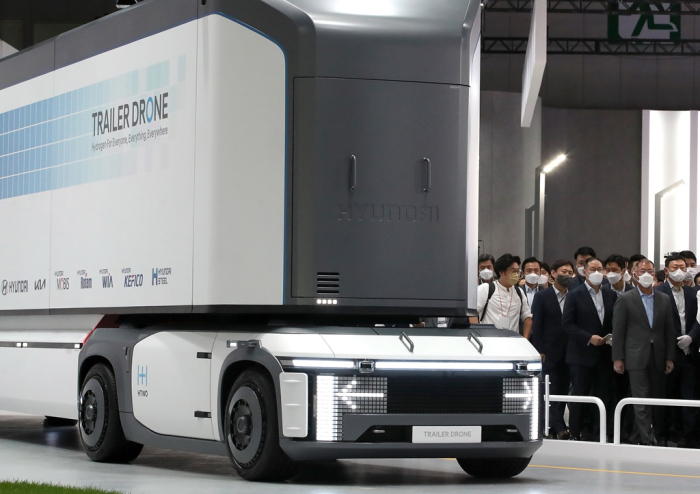Hydrogen economy
Hyundai Motor to start hydrogen popularization in 2040
Not to release new commercial vehicles with internal combustion engines from now on
By Sep 22, 2021 (Gmt+09:00)
3
Min read
Most Read
LG Chem to sell water filter business to Glenwood PE for $692 million


Kyobo Life poised to buy Japan’s SBI Group-owned savings bank


KT&G eyes overseas M&A after rejecting activist fund's offer


StockX in merger talks with Naver’s online reseller Kream


Mirae Asset to be named Korea Post’s core real estate fund operator



Hyundai Motor Group, the world’s fifth-largest automaker, declared to make 2040 the first year of hydrogen energy popularization
The group was the first conglomerate in South Korea to study hydrogen and introduce related products, indicating its determination to become the country’s leader of hydrogen popularization.
Hyundai Motor Group unveiled detailed plans for the popularization.
NO MORE INTERNAL COMBUSTION ENGINE COMMERCIAL VEHICLES
The group will not release new commercial vehicles powered by internal combustion engines from now on. Hyundai Motor Co., South Korea’s top carmaker, plans to mass produce the Xcient, a fuel cell electric truck, at home from the first half of 2022. It aims to apply fuel cells to all of commercial vehicle lineups by 2028 for the first time in the global industry.
The company plans to expand its shares in European medium- and large-sized commercial vehicle markets of 400,000 units a year. For the market, it is developing a 5- to 7-meter fuel cell purpose-built vehicle (PBV).
The group is scheduled to introduce its third-generation fuel cell system by 2023 with its production cost cut by half, the package volume reduced by 30% and power output doubled.
It unveiled prototypes for 100 kilowatts (kW) and 200 kW. The 100 kW system is about 30% smaller than the existing system. The 200 kW system, which is for commercial vehicles, is similar with the one installed in the hydrogen-electric sport utility vehicle (SUV) Nexo in terms of volume but its output doubles.
The new fuel cell system’s price is set to fall to a half of the existing one. The group aims to cut prices of fuel cell electric vehicles to the levels of electric vehicles (EV) by 2030. The third-generation system is to be used not only for cars but also for ships, trains and buildings.
“The goal is to make hydrogen readily used for everyone, everything, and everywhere,” Hyundai Motor Group Chairman Chung Euisun said on Sept. 7.
HIGH-PERFORMANCE HYDROGEN FUEL CELL CARS
In addition to cars, Hyundai Motor Group is preparing for other future hydrogen mobility such as the Trailer Drone, a hydrogen-powered container transportation system capable of operating autonomously.
The trailer sits on the fuel cell “e-Bogie,” which enables “unprecedented” maneuverability through sideways movement. The vehicle, which was unveiled earlier this month, runs more than 1,000 km on a single charge, according to Hyundai.
Hyundai Motor Group is developing high-performance hydrogen fuel cell cars. It showcased a concept hydrogen-powered hybrid sports car, named the Vision FK. With a maximum output of over 500 kW and a 600 km range, the Vision FK concept can accelerate from zero to 100 km per hour in less than four seconds, according to Hyundai.
Its new hydrogen mobility solutions under development include the Rescue Drone, which a fire monitor and flying drone sit on the e-Bogie, and the “H Moving Station”, a mobile hydrogen charger.

CHAIRMAN’S INITIATIVE
The group chairman Chung steered the declaration of its vision for a hydrogen society.
“It is impossible to deal with climate change without hydrogen energy,” Chung said. “The transition to a hydrogen society is not something individual companies can do, but Hyundai Motor Group judged that it could no longer just watch."
Chung already led the foundation of the much-touted Korea H2 Business Summit that the country’s 15 major business groups joined in a bid to gain the upper hand in the global hydrogen market forecast to grow to 3,000 trillion won ($2.5 trillion) by 2050.
“We will enhance the integrity and competitiveness of the hydrogen industry ecosystem,” Chung stressed. “My country is behind the curve relatively, but there is nothing we can’t do.”
Write to Byung-Uk Do at dodo@hankyung.com
Jongwoo Cheon edited this article.
More to Read
-
 Hydrogen economyHydrogen: Next big thing for stock investors in Korea
Hydrogen economyHydrogen: Next big thing for stock investors in KoreaSep 13, 2021 (Gmt+09:00)
4 Min read -
 Hydrogen economyKorean conglomerates bet big on hydrogen, launch H2 council
Hydrogen economyKorean conglomerates bet big on hydrogen, launch H2 councilSep 08, 2021 (Gmt+09:00)
4 Min read -
 Hydrogen economyHyundai Motor’s Chung Euisun: Vision 2040 for hydrogen society
Hydrogen economyHyundai Motor’s Chung Euisun: Vision 2040 for hydrogen societySep 07, 2021 (Gmt+09:00)
3 Min read -
 Hydrogen economyKorea’s hydrogen council to launch Sept. 8; Hyundai to unveil new tech
Hydrogen economyKorea’s hydrogen council to launch Sept. 8; Hyundai to unveil new techAug 26, 2021 (Gmt+09:00)
3 Min read -
 Hydrogen economyHyundai Mobis to invest $1.1 bn to make hydrogen fuel cells
Hydrogen economyHyundai Mobis to invest $1.1 bn to make hydrogen fuel cellsAug 20, 2021 (Gmt+09:00)
2 Min read
Comment 0
LOG IN


